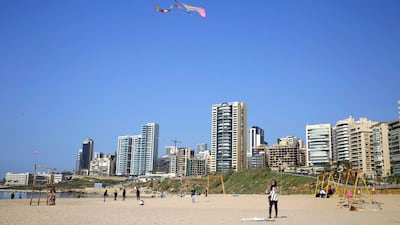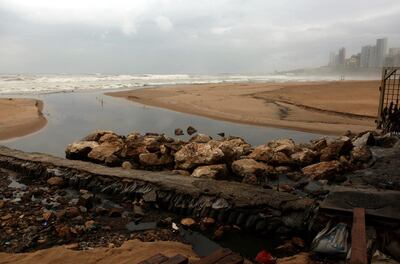Flanked by towering mountains and dotted by sandy beaches, Lebanon’s lulling shores were once the coveted summer destination for Europe’s elite and the weekend getaway for locals.
A stone’s throw from most urban areas, the country's 225-kilometre coastline runs north to south, cutting through the capital Beirut and other major cities of Tripoli and Sidon.
But many of these beaches today are controlled by private resorts whose entrance charges make the sands unaffordable to most Lebanese citizens. And a decades-old battle over the ownership of Lebanon’s littoral has been reignited as new luxury developments increasingly encroach on public beaches.
The opening of resorts over the past year has caused outrage among activists who accuse developers of skirting regulations, blocking access to public beaches and damaging the environment.
“It makes me angry,” said Mohammad Ayoub, the director of Nahnoo, an NGO that campaigns for the right to public space. “This is our right. This is our sea. It’s unfair to privatise what we own.”
Lebanon’s shrinking coastline dates back to the country’s 1975-1990 civil war, when developers took advantage of the absence of state to build a flurry of resorts along the shore.
They were constructed in violation of a 1925 law, passed before Lebanon had written its constitution, which stipulates that the “seashore till the farthest distance that the wave could reach in winter and sand shores and pebbles” belongs to the public.
That law has been chipped away at and weakened over the years by subsequent decrees that have made it easier to build on coastal land. Today, only 20 per cent is accessible to the public.
__________
Read more:
Lebanon rubbishes its tourism industry
Lebanon residents wake up to a beach covered in rubbish
Radioactive cylinder found on Lebanon coast
How corruption and complicity threaten Lebanon’s marine life
__________
“The leaders of the war, who profited from these developments, became members of parliament. That’s why they didn’t remove the illegal construction,” said Mr Ayoub.
Travel guides describe the country’s beach clubs and coastal resorts as havens of glamour, harking back to pre-war glory days, before chaos descended and caused a massive fall-off in foreign tourism. The civil war in neighbouring Syria has also kept international visitors away.
But for people who simply want to visit the seaside, relax and go for a swim, the privatisation of beaches has become another symbol of corruption and inequality in a country where business and politics are intertwined.
Beirut’s only public beach, Ramlet Al Baida recently lost a sizeable chunk to the construction of a five-star hotel that juts out on to the sand. The Eden Bay resort earlier this year was confronted with protesters who said the development broke several zoning laws.
Dalieh, a sloping, rocky outcrop just up the coast from Ramlet Al Baida, has been used by fishermen and the Beirut public for decades - it too is under threat from plans to build a sprawling tourist area, with a boutique hotel.
Many of these developments are damaging the local environment, or destroying areas of cultural value.
In Mansouri, in southern Lebanon, a brand new resort has disturbed a protected beach that hosts mating sea turtles every year. Up north in Anfeh - a coastal town once used by the Phoenicians as a shipyard - rumours of a giant development that would take over an area of historic salt marshes have been circulating for years. Activists believe it is only a matter of time before it is approved.
Lama Karame, a lawyer and campaigner who worked on the Eden Bay case, told The National that local municipalities approve projects even though they contravene regulations.
“The municipality is disregarding the existing decree and laws and is providing permits that clearly violate construction and zoning laws, and laws that regulate the coastline,” she said. “These permits allow resorts to, indirectly, privatise the public land.”
Ms Karame said the loss of public land to these resorts is something that affects Lebanon’s poor disproportionately, because they cannot afford to visit the private clubs.
“Everything we need is only available if we pay money, and it’s getting worse. The fact that there is no public space where all social groups can meet is really dangerous,” she said.
The resort owners insist they are not to blame for the problem. Jean Beiruti, head of a syndicate of seaside resort operators, said the proliferation of private operations is a result of a lack of government investment in public beaches.
“The problem in Lebanon is that the public beaches are not of a high standard. People are looking for the private sector because there is no public sector,” he said. Sand beaches, argued Mr Beiruti, are publicly owned, and businesses rent them.
“If you want to go to Byblos and walk along the private beaches, you can walk in front all over, and swim, and nobody can stop you,” he said. “It’s the same thing if you go to Cote D'azur. You can walk on the beach in front of them, but if you want to sit you have to pay the rent of the chair.”
Most private beaches, however, have barriers and security guards, making it impossible to access the beach by land without paying.
“In Cote D’azur, all the land used to be private. [The government] bought all the land next to the beach. They can do that here. We should create an organisation to buy all the private land next to the beaches, and use the money generated from them to buy more” he said.
A stipulation in Lebanon’s annual budget last year aimed to partially regulate the resorts by forcing the owners to pay huge fines and taxes backdated to the civil war, which could amount to more than $1 billion (Dh3.6 billion).
The government said the money would be used to improve the beaches that are publicly managed, many of which are dangerously polluted.

But a recent spike in the bacteria levels in the water around some fishing villages and the presence of rubbish on the beaches suggests the money has been invested elsewhere or not at all.
Many doubt the government’s ability to take on powerful economic interests that have managed to bend the rules for so long.
“They are almost the same people,” said Mr Ayoub.
Despite the recent defeats, Mr Ayoub hasn't lost hope and says the tide could be turning.
“There is a lot of resistance nowadays against privatising public space,” he said. “During the war, and later, people didn’t know what was happening. Now there is more awareness. So things are changing.”


